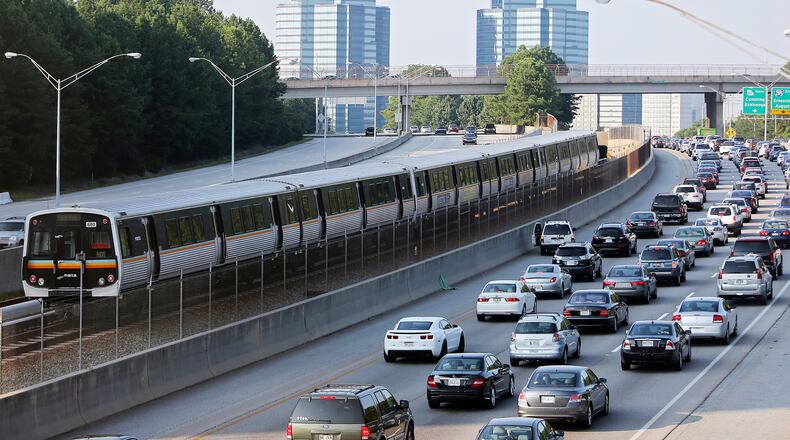The city of Atlanta and north Fulton County are headed for a divorce. Those close to the negotiations describe the separation as "amicable."
The immediate cause is a changing balance of power when it comes to commuter rail, which might as well be charged with alienation of affection.
As in many divorces, it is the other family members who could suffer. North Fulton will retain custody of South Fulton, in a manner of speaking.
Late Wednesday, the state House passed, 169 to 4, a late-blooming compromise on MARTA’s plan to expand its rail operations.
Originally, the transit agency had pitched an $8 billion push into north Fulton and, separately, into the Emory University area of DeKalb County. It would have been funded by a half-penny sales tax levied in Fulton, DeKalb and Clayton counties.
Opposition by mayors and lawmakers in and around north Fulton killed SB 330, which had been pushed by Sen. Brandon Beach, R-Alpharetta, in the Senate.
But on Tuesday, a second north Fulton lawmaker stepped up. "We started working on it eight days ago. In the course of three days, I've had seven drafts," said House Speaker pro tem Jan Jones, R-Milton, after her rewrite of the MARTA legislation debuted in a House committee.
The new measure, a much smaller version of MARTA’s ambitious plan, had been tucked into the gutted carcass of a Senate fireworks bill.
Jones said she only weighed in when she saw that MARTA wasn’t giving up. On the transit agency’s behalf, state Rep. Pat Gardner, D-Atlanta, had introduced a smaller version of MARTA’s big push. But it still didn’t really get at the crux of the conflict.
“No one asked me. I just decided,” Jones said. “I thought, ‘This is not settled. We need to settle this.’”
That began an eight-day marathon aimed at who gets control of a one percent, countywide sales tax worth billions of dollars – and what the money would be spent on.
When the Legislature last year passed HB 170, a bill to provide nearly $1 billion a year in funding for road and bridge repair, Georgia’s 159 counties were allotted a one-cent, five-year sales tax they could ask their voters to approve for any transportation purpose at all.
This might work elsewhere, but not here. Not anymore. In most other locales, the forces of road-and-bridge builders hold sway, unopposed. But in metro Atlanta, that dynamic is changing.
A poll conducted last fall by the Metro Atlanta Chamber showed attitudes shifting in the direction of commuter rail. Specifically, the survey indicated that a referendum on that one-cent sales tax in Fulton County would be doomed if it were a roads-only measure.
In other words, if transit supporters didn’t get their share of the pie, there would be no pie. Commuter rail enthusiasts are in a position to veto the road-only crowd, and vice versa.
It was a poll that state lawmakers actually believed. Alpharetta could block Atlanta’s ambitions, but Atlanta could also deny Alpharetta.
“It was an impasse,” Jones said. And so the divorce.
“We had to untether the two. When I thought about that framework, everything became much simpler and cleaner. Honestly, I think it will help the county work together better.”
Jones said her legislation recognizes that Atlanta and Fulton County are an economic crossroads for the state, and so attention must be paid to rising corporate demands for transportation alternatives.
But likewise, she said, north and south Fulton aren’t “chopped liver.”
"What they want matters. And it may not be just what the city of Atlanta wants for them. That's okay, too," Jones said. And so we get to the terms of the divorce. SB 369, the ex-fireworks bill, would:
-- Create two special tax districts. One would be the city of Atlanta, and north and south Fulton.
-- Atlanta, on MARTA’s behalf, would be allowed to levy, by referendum, a .5 percent sales tax that would run several decades, concurrent with the present one-cent sales tax.
The tax would raise $2.5 billion for rail and other projects that would be on a list first put to voters.
-- South and north Fulton, working together, would be allowed to levy, also by referendum, a .75-percent sales tax that would sunset every five years. Given north Fulton’s population advantage, that region would be in the drivers’ seat.
The .75 percent cap is important. Should the forces in north Fulton change their minds about commuter rail, a .25 percent cap would be available for that purpose.
-- With this bill, the matter of a half-penny sales tax in DeKalb and Clayton counties for enhanced MARTA rail has been postponed for at least a year. In DeKalb, that’s probably a good thing. That place needs a permanent county CEO before tackling the issue.
MARTA officials were on board with this. Atlanta Mayor Kasim Reed has yet to weigh in personally, but Jones mentioned that one person she negotiated with was Robert Highsmith, the outside counsel for MARTA and a close confidante of Reed. Presumably, the mayor has stayed informed.
To everything there is a season, Jones said, just before the bill passed the House. “It’s important to solve the things that are ripe and leave for tomorrow the things that are not,” she said.
SB 369 now goes to the Senate, which could quickly hold an up-or-down vote on the measure and – if it so chooses – send the divorce papers to the governor.
About the Author
The Latest
Featured




